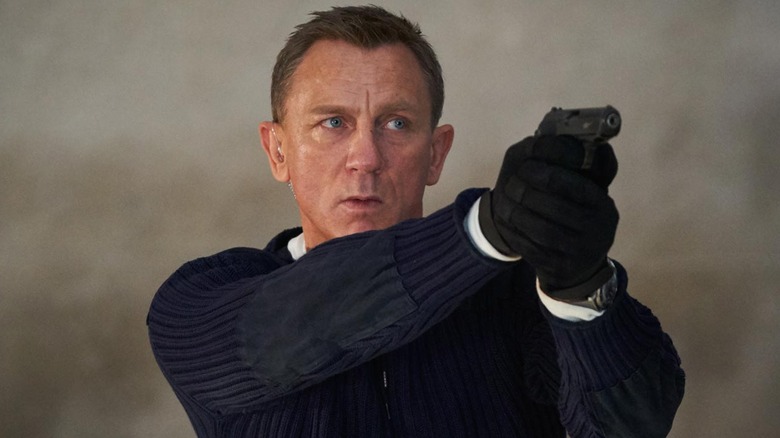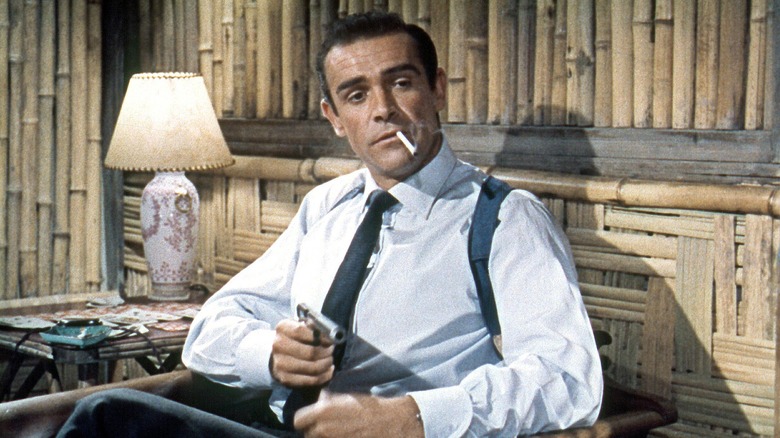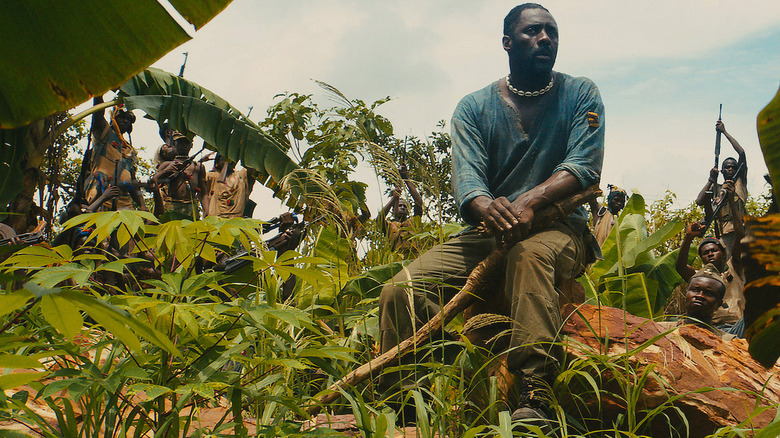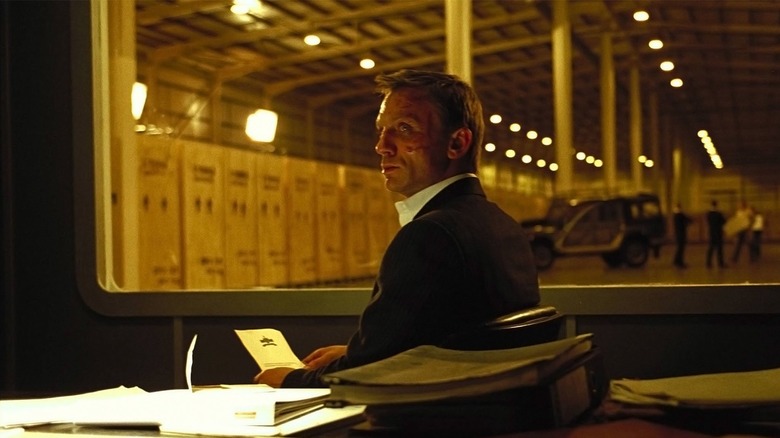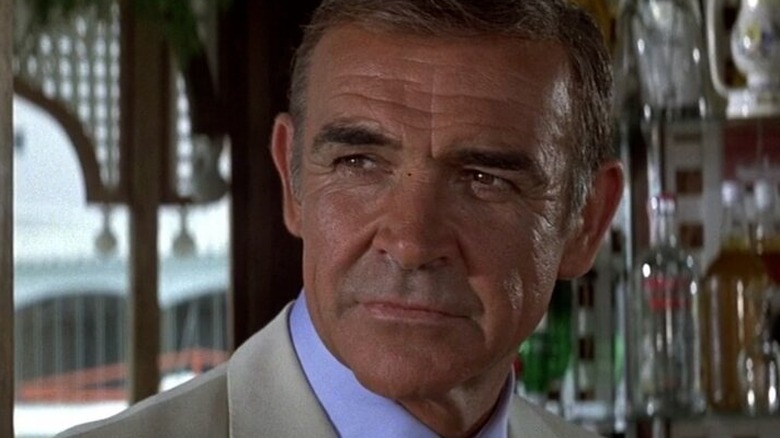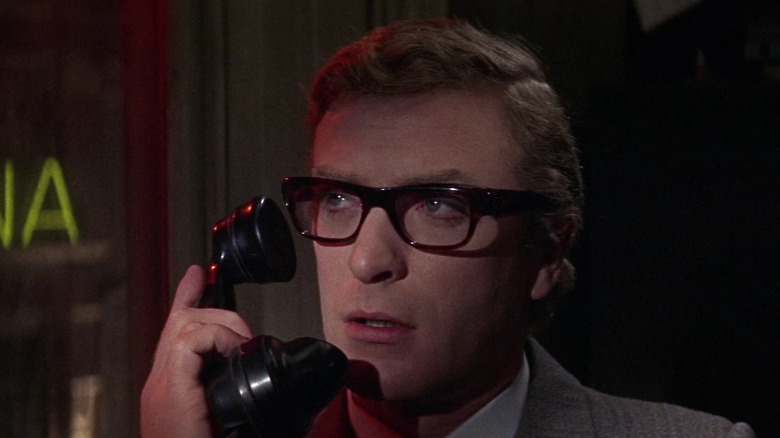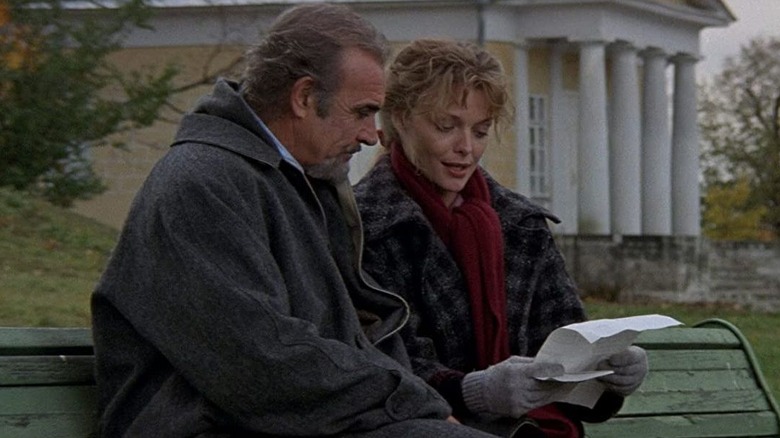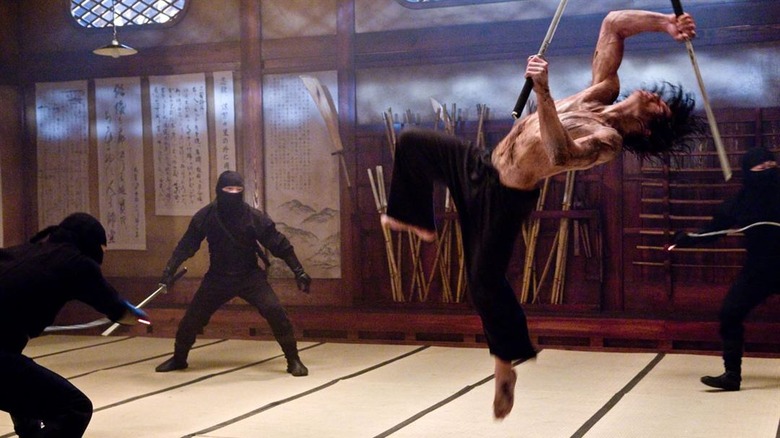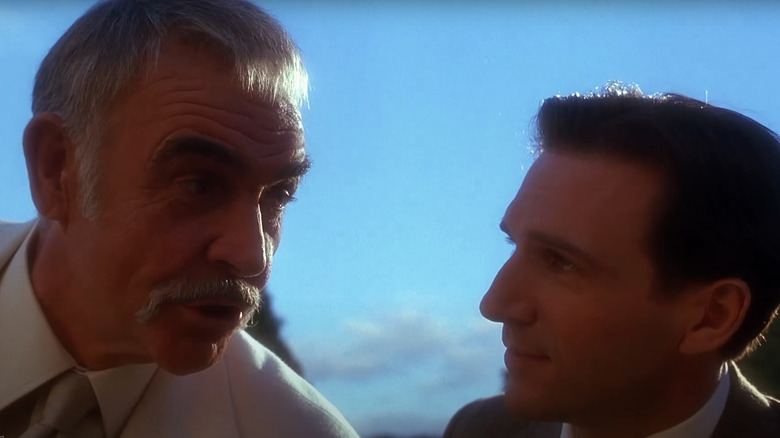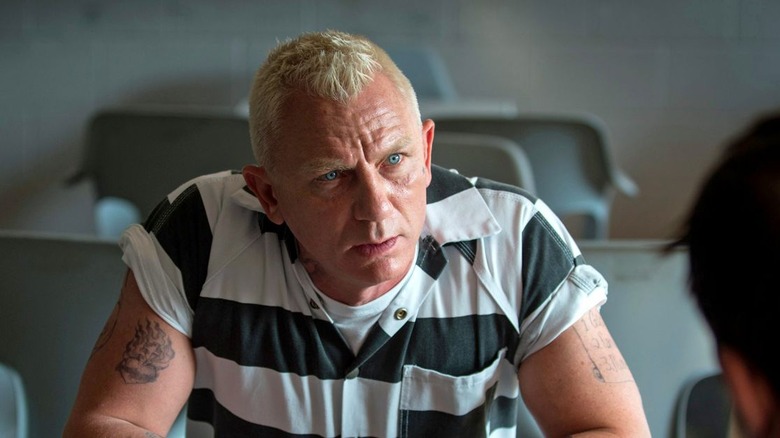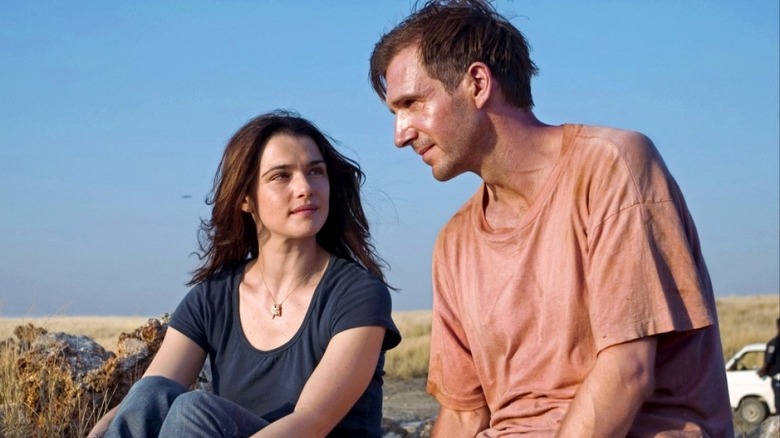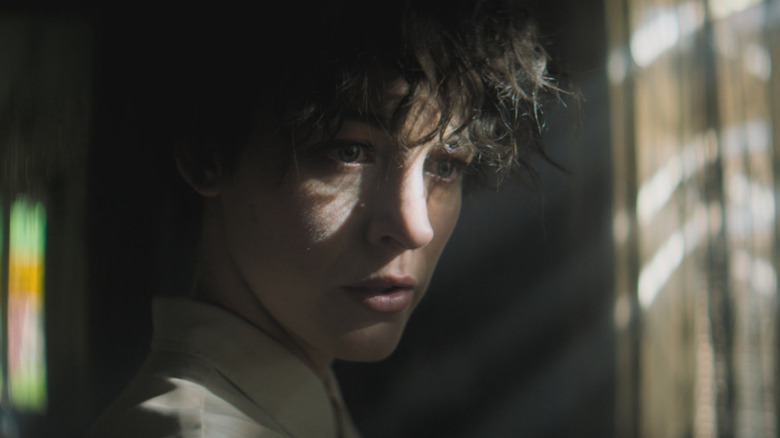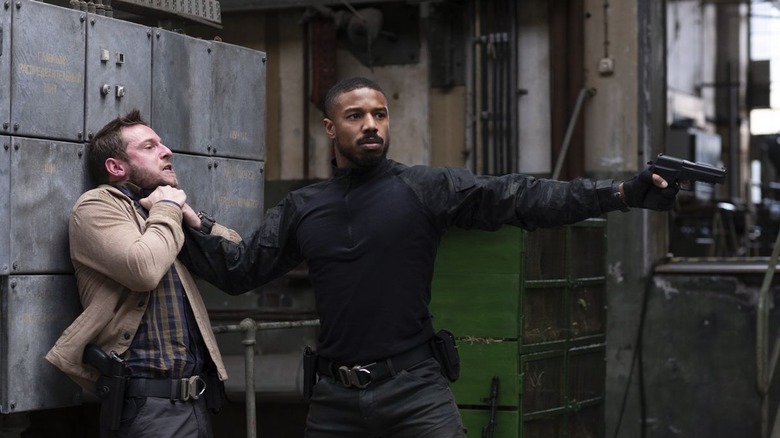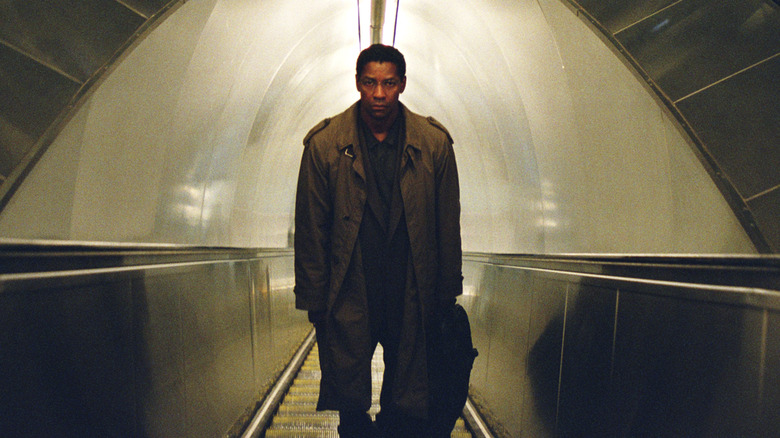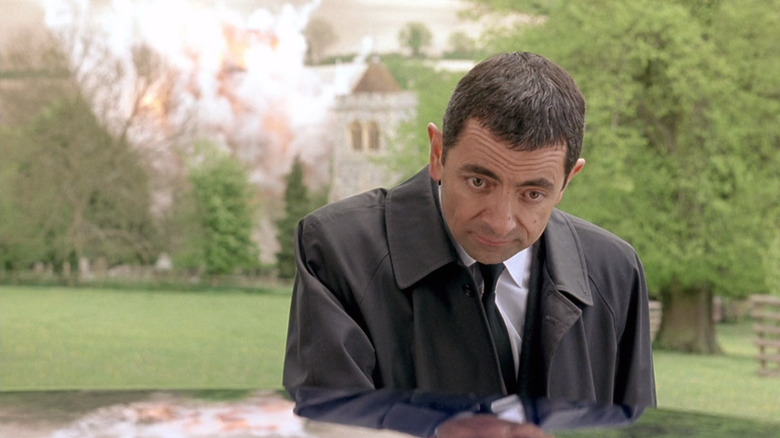14 Movies To Watch If You Loved No Time To Die
At long last, it's time to "Die." Factoring in coronavirus delays, this ties the longest gap between Bond films, from "License to Kill" to "GoldenEye," at six years. The wait has made "No Time To Die" both sarcastic and momentous. Daniel Craig is hanging up his Walther. For the first time ever, ad spots are hinting at an end, calling Bond #25 no less than an "epic conclusion." Whoever shows up at the end of the gun barrel next, they won't be taking aim anytime soon.
But there are alternatives — 24 of them come to mind most obviously. There's a Bond film for every season, but more to each of them than their ancestry. Some of the following recommendations highlight similar work from the stars before enlisting in Her Majesty's Secret Service. Others are adjacent pieces of espionage pulled from the same genre trappings. And naturally, James Bond does return.
Dr. No
The hottest rumor around "No Time To Die" is that it's secretly a remake of "Dr. No," the very first Bond film. There's enough smoke to the fire that Rami Malek, who plays supervillain Lyutsifer Safin, had to dodge the question head-on: "I'm not going to bite on that, but I do think it's interesting." Whether or not it's true, the release of Bond #25 is still a worthy occasion to revisit the original Bond flick that started it all.
The first time 007 shoots somebody, he does it in cold blood. His second bullet lands in that dead man's back. It's easy to forget with all the spy-fi hokum we've gotten since, but Bond had ice in his veins from the word "No." He's a state-sanctioned executioner in Technicolor beachwear. His rougher edges would be sanded off within two sequels, but the roughest made him a legend — Sean Connery, never more dangerous.
"Dr. No" is nitroglycerin before dynamite. What's shoddy now was already suspect then — quoth The New York Times: "Not to be taken seriously as realistic fiction or even art." But nearly 50 years later, the blueprint hasn't lost any luster.
Beasts of No Nation
It's difficult if not impossible to nail down the exact budget of blockbusters as big as Bond. Estimates place "No Time to Die" at $250 million. It's an astounding figure — among the most expensive in film history — only made more astounding by director Cary Joji Fukunaga's previous film, a $6 million drama released directly to Netflix.
"Beasts of No Nation" is an inside-out Peter Pan story, told from the diminutive perspective of a boy forced to grow up. Fan-favorite Bond candidate Idris Elba is the one keeping them enchanted as the sadistic, seductive Commandant. By his magnetic word, child soldiers become true believers. When he asks who's ready to kill in his name, they raise eager hands. Their assaults have the sickly enthusiasm of a playground game. Only Agu, played with preternatural skill by Abraham Attah, shows signs of reluctance.
Fukunaga turns the Uzodinma Iweala novel of the same name into a portrait of lush color and horrible texture. Beyond proving that prowess behind a camera, "Beasts" is a stark reminder of the modern Hollywood ecosystem, where something this small and brutal could be a prelude to Bond.
Layer Cake
Daniel Craig has played James Bond for 15 years, longer than any other actor in the role. That makes it easy to forget he ever wasn't Bond — let alone the work that got him the job in the first place.
Craig's character does not get a name in "Layer Cake," only a designation — XXXX — and it's in smart self-defense. XXXX is the Cadillac of mid-level coke dealers. He knows the business and his business and how to keep them apart. But as a glorified go-between, that confidence looks a lot like cockiness from below and delusion from above. Everyone knows he can't just retire as announced. The low men are too twitchy. The old men, too crusty. The catch to criminal business is that second word — Craig believes it's a business, foolishly, terminally, to his very marrow.
Expensive suits aside, XXXX is not 007, even if the modern box art for the film makes the comparison more explicit than ever. He's a descendant of the Caine dynasty, a side-smiling lad for whom the gravest consequences remain largely conceptual. Craig brings sobriety to that arrogance and effort to the cool — and behind those baby blues, this guy's a bigger sucker than any of them.
Never Say Never Again
Daniel Craig's resignation from Her Majesty's Secret Service in "No Time To Die" marks the first time since Sean Connery that a Bond knew his last day on his last day. The original 007's third and final farewell, "Never Say Never Again," is especially resonant because, for all the sweat spent proving Sean wasn't too old for action, he was the same age then as Craig is now.
The "Never" Bond is more of a lover than a fighter by default. He's reintroduced failing an elaborate training exercise and not for the first time. In "Thunderball," his ordered rehabilitation was due to injury. In this legally fraught remake, it's obsolescence. Save a few double entendres, though, Connery's age is ignored entirely. With a savvier film around him, it would've worked; flirting across a Gravitar arcade cabinet, he's never looked older.
Both Connery and sitting 007 Roger Moore — then 56 with one more film in him — were unfairly painted by the press as shoulder-holstered dinosaurs. Their respective charms remained very much intact. "Octopussy," the official competition, stands as the better film, but "Never Say Never Again" is the more interesting movie: an early, seedy, not entirely intentional study of how action heroes are allowed to age. In the end, Bond retires. It's taken the real series 38 years to let him try.
Billion Dollar Brain
Not many spies of Bond's caliber leave the service with life and limb intact. Of his big screen contemporaries, only Harry Palmer has pulled it off before, leaving the world of espionage behind for the simpler dishonesty of private investigation.
At the beginning of "Billion Dollar Brain," Palmer is content, and that's his first mistake. There's no rest for agents like him, sarcastic desk warmers with pliable criminal records. Private citizenship just means his former boss has to knock first before giving orders. But when a computerized voice commands him to transport a Thermos to Helsinki, Harry does it out of morbid curiosity — his second mistake.
The Harry Palmer trilogy was produced by Bond franchise co-parent Harry Saltzman as wry, world-weary counterprogramming to his more famous creation, with Michael Caine providing a bone-dry alternative to Sean Connery's 007. The first two films, "The Ipcress File" and "Funeral in Berlin," keep their espionage down and dirty, but "Brain" feels no obligation to keep that up. In his only film as a hired gun director, provocateur Ken Russell perverts the 007 franchise formula — which by the time of this film's 1967 release is already five movies deep — into near absurdity. The fall of man is hidden in farm-fresh eggs. Smooth-helmeted soldiers in white spill out of gleaming semis. Proud Texans hoe down in the shadow of a second-draft swastika. World War III hinges on a few lines of code. It's more biting and bizarre than Bond's ever been, with a cockeyed lesson that hasn't lost any luster — saving the world never used to be this weird.
The Russia House
Even if it's off the books, "No Time to Die" marks the reunion of MI6 and CIA forces, of James Bond and Felix Leiter. Until the Craig era, the Bond series has generally depicted the two agencies as equal-opposite superpowers. They're equal in "The Russia House," too, just in a less flattering way.
John le Carré's story isn't even about a spy. Sean Connery plays British publisher "Barley" Scott-Blair, who splits his time telling lies in Lisbon bars and waxing philosophical at writers' retreats. He's the life of any party that'll have him, and few won't. When a sensitive Russian manuscript lands in his mailbox, he's also the last operative any western government wants.
Not that the CIA, headed by Roy Scheider's Russell, or MI6, led by James Fox's Ned, keep too close an eye on him. They instead watch his electronic reconnaissance like an ESPN broadcast, never questioning the hastily trained player in that faraway field. It's their loss — seeing Sean Connery mock the very thought of spying and instead fall in love is the rarer thrill.
Ninja Assassin
"Ninja Assassin" is exactly what it says on the tin, give or take the traditional restraint implied. The ninjas' first victim, a gangster who finds old-fashioned terror around the word "ninja" laughable, gets his head hinged open like a fast-food box. They may be invisible and they may be silent, but these ninjas strike with the cleanliness of a Cuisinart.
Anyone still unconvinced should get the joke when gore dripping from a severed head in a washing machine is compared to ketchup splattering a ballpark frank in a match-cut. "Ninja Assassin" is everything that got it crucified with critics at the time — silly, shamelessly overwrought, and astoundinglynin violent. The computer-generated carnage is a feature, not a bug. Naomie Harris, doing a little Bond work as a Europol agent, sells the absurdity like she's the only one who's seen dailies: "I have reason to believe that a group of ninja may be on their way here."
If the ninjas came around a little more often, "Ninja Assassin" would've found immortality on the sleepover circuit. As it stands, this is a gruesome curio with a double-digit runtime. Low investment, high body count.
The Avengers (1998)
As a side effect of James Bond's cinematic longevity, many actors once in the running for a license to kill end up in the franchise elsewhere. For instance, Ralph Fiennes, the current and hopefully continuing MI6 boss M, was considered for 00 status earlier in his career. By his own assessment, missing that opportunity was for the best.
"The Avengers" made perfect financial sense on paper: Fiennes and Uma Thurman, both on a white-hot streak at the time, spar with Sean Connery himself in a witty update of a beloved television show. In practice, it's one of the most baffling tentpoles ever made. Each scene is a fresh non sequitur, only apparently connected by the famous faces that wander through. To preserve his evil cohorts' identities, Connery mandates a bear-suit dress code for his conferences. Fiennes wears a bowler hat and nothing else into the company sauna. It's a collection of quirks beaten into the vaguest shape of a summer blockbuster.
The film is an unmitigated disaster, best and only enjoyed as a pop cultural frog pinned to a dissection board. "I loved going to work on 'The Avengers,'" recalls Fiennes. At least that shows.
Logan Lucky
Daniel Craig has never been shy about his fraught relationship with 007. With "No Time to Die," he's made his peace. What he makes next should be a relative vacation for the star and, if his interim projects are anything to go on, a pleasant surprise for audiences. His turn as Benoit Blanc from "Knives Out" might've kickstarted a new franchise, but it's Joe Bang from "Logan Lucky" who introduced Daniel Craig, kook, to the world.
As a criminal mastermind, Bang is the man with one eye in a county of the blind, though he can't see too well on account of the prison bars. That doesn't stop the dim-bulb Logan brothers from asking him to be a part of their homegrown heist. That also doesn't stop Bang, explosives proficiency coincidental, from entertaining the idea.
Forget Craig's accent here, the Ernest P. Worrell to Blanc's Colonel Sanders, and any preconceived notions therein — Bang is a self-taught chemical engineer. He builds a bomb out of bleach pens, low-sodium salt, two bags of gummy bears, and times it to the twist of a grocery bag. His own short fuse is just an occupational hazard — Bang appreciates a good shot and getting nekkid in the back seat of a Mustang as much as anybody.
"When you know him even a little," said director Steven Soderbergh, "you know that he's funny." Craig clearly appreciated the proof.
The Constant Gardener
Seven years after "The Avengers," Ralph Fiennes returned to spy craft with a reluctant vengeance. There are no bon mots or whiz-bang effects, only sorrow on both personal and global scales. "The Constant Gardener" rates among the great John le Carré's angriest novels, by his own admission: "The multinational pharmaceutical world, once I entered it, got me by the throat and wouldn't let go," he once told The Guardian.
The international incident at the heart of "Gardener" involves a western pharmaceutical company using Kenyans as guinea pigs for drugs that may or may not carry an excessive mortality rate. Though le Carré pulls back the curtain early, trading surprise for righteous fury, the film plays coy. Revelations come as stages of grief, as Fiennes discovers more about the suspicious death of his activist wife, Rachel Weisz. Narrowing the scale to a close-up, on alternately loving and lost faces, reduces espionage to its simplest, mortal cost.
There's a cancerous pessimism itching at its broken heart, but that lends "The Constant Gardener" a sobering authenticity. This is how and why the game is still played. It made le Carré furious. The film honors his fury.
The Rhythm Section
Since its inception, Eon Productions has only directly produced one non-Bond film: 2020's "The Rhythm Section." That pedigree alone should've earned it attention. Instead, it holds the ignominious record of worst opening for a 3,000-plus theatrical release.
Expectation had something to do with it. It's not a "female Bond film." Blake Lively's junkie sex worker is, at best, a loose end for the real Bond-types, who only run at two speeds in this world: opportunistic and shell-shocked. Jude Law's MI6 ex-pat has resigned himself to the former. When Lively demands his training to avenge her family, killed as byproducts of a careless op, Law doesn't hold back. There's no fun in this violence. He hits her until she can hit back. It gives her competence, but not proficiency or the hypothermic calm needed to take lives for a living. Her assassinations are agony — the easiest still ends with the target quietly pleading for his children. She's an amateur among pros, the most likely to die in any room and aware of it.
Lively is the reason to watch; she gives her all to embody the dying breed of action hero that bruises when punched. If the conspiracy at the heart of the film didn't peter out to such an underwhelming end, this could've been the start of a fresh spy franchise. As-is, "The Rhythm Section" is an uneven curiosity and worthwhile what-if.
Without Remorse
If Ian Fleming is the reigning British spymaster at the box office, Tom Clancy is his closest American cousin. After a '90s surge that saw three adaptations of his work in four years, the insurance-salesman-turned-novelist cooled on Hollywood. There had only been two films since, one after his death, until 2020's "Without Remorse." Whether it kickstarts a resurgence of Clancy-brand cloak and dagger in theaters is too early to call, but one thing's for sure — its leading man, Michael B. Jordan, is a movie star.
If the Bond franchise mints movie stars, Clancy films bask in them. A quick glance at the list of Clancy heroes is proof enough — Sean Connery, Alec Baldwin, Harrison Ford, Ben Affleck, Chris Pine. Jordan takes that baton and sprints with it while using his free fist to take down a SWAT team. The politics are just wallpaper — this is a doorstop airport novel boiled down to its ruthless, sometimes malnourished essence.
Jordan, here a shredded golem of vengeance, knows solace was never on the table. He settles for blood and fireworks instead. This is not a film of half measures; to interrogate a corrupt politician, he crashes into his car, lights it on fire, then slides next to him in the backseat. It's a trashy B-picture starring a triple-A star at the height of his physical powers. Expect anything else at your own peril.
The Manchurian Candidate (2004)
"I have these dreams, sir." With one line, Jeffrey Wright claws under the skin of Denzel Washington, the cinematic definition of strength. The rest of his jittery ramble, conflicting memories of a tour they shared in the Gulf, festers there long after his mysterious disappearance.
Jonathan Demme's 2004 remake of 1962's "The Manchurian Candidate" is as intentionally uncomfortable as blockbusters get, especially in the immediate wake of 9/11. This America, depicted sometime after the stopwatch had been thrown out on the forever war, vaunts its military heroes from Over There until they break. Washington is unbroken enough to give speeches about how great the president was in combat. When his dreams start matching Wright's, he's disposed of just as fast.
Without spoiling too much conspiracy, the puppeteers are blurrier, the strings longer, and the song-and-dance more bleak now than it was in 2004. And it all starts with an astounding turn from Wright as the poisoned canary in a patriotic coal mine.
Johnny English
The Bond franchise has a begrudging relationship with the pop culture around it, only changing when cornered and updating when lapped. A better barometer for how times change are the parodies that come and go in its wake. Consider "Johnny English," written by 007 screenwriters-in-residence Neal Purvis and Robert Wade. Compared to "Die Another Day," released the year prior, the spoofing isn't too far over par. Compared to "Casino Royale," it might as well be a transmission from space.
Rowan Atkinson's MI7 pencil pusher grew up on a steady diet of Roger Moore. His superspy dreams are the stuff eyebrow raises and karate chops are made of. Only when his own incompetence gets every existing agent killed is he allowed into service. There's no gadget he can't misuse, even the few that Bond already demonstrated like the "For Your Eyes Only" identikit and "Goldfinger" ejector seat. It's a silly love letter to everything the franchise was and soon wouldn't be.
The sequels, "Johnny English Reborn" and "Johnny English Strikes Again," rolled with the changes. Parkour, cyberattacks, and soulful retreats from active duty became targets. That unlikely longevity has earned the character a strange honor — Atkinson played English as long as Craig played Bond, 15 years, making him the longest-serving parody alongside the longest-serving 007.
